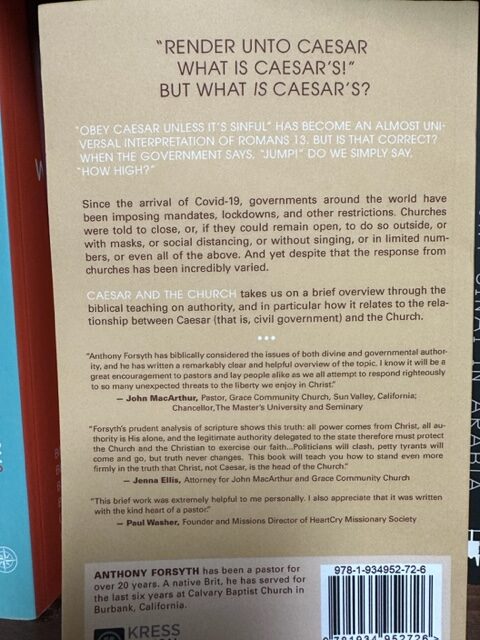Anthony Forsyth’s Caesar and the Church: A Biblical Study of Government and the Church (January 2022) was published in the midst of the COVID-19 government mandated lockdowns and restrictions on churches in the United States. The book asked and answered a critical question for our time: Does Romans 13 mean that Christians must always obey governing authority unless it’s sinful? Forsyth answers this question by challenging the typical interpretation of Romans 13:1–7. He insists that we need to avoid interpreting the passage in isolation. A detailed study, especially in the context of what we read in Romans 12, is necessary to come to a mature understanding of how we should respond to officials in authority.
Jesus instructed His disciples to “render to Caesar the things that are Caesar’s; and to God the things that are God’s” (Matt 22:21, NASB95). Forsyth cleverly used “Caesar” as a synonym for any given governing authority. So just what is it that belongs to Caesar?
The detailed study needed to understand Romans 13 is broken down into three parts: “Biblical Foundations and Principles,” “What has Caesar Been Delegated?,” and “Responding to a Biblical Understanding of Authority.” Each part is broken down into chapters. My favorites include “All Authority is God’s” (Ch. 1), “Caesar Does Not Decide What is His” (Ch. 6), and “Evil Caesars” (Ch. 11). The conclusion is powerful. Forsyth boldly asserts that it is our duty to submit to Caesar to the extent that he ministers as a servant of God. But when Caesar goes beyond these boundaries, he has also gone beyond his authority over us.
Forsyth admits that his interpretation of Romans 13 is a minority view. But he makes a compelling argument. In fact, after reading through Caesar and the Church, I find myself in agreement with Forsyth. And I can be stubborn, so my hat’s off to the author.
John MacArthur provided an editorial recommendation, which is notable considering that the congregation he pastors, Grace Community Church, defied COVID-19 related lockdown orders issued by Los Angelas County. County officials sued Grace in 2021, but ultimately it would be the county who paid out a 400,000 settlement to the church. Anyone sympathetic to the congregation of Grace would be encouraged by Forsyth’s approach.
The book is relatively short (ca. 40,000 words). But given that just one passage is the focus of the work, the length strikes me as well balanced. If it was much longer, the content would run the risk of being repetitive and pedantic.
I was late to the party reading Caesar and the Church. And to some, it may seem less topical now. But I suspect that the governments of the world aren’t done using lockdowns and restrictions (for whatever contrived reason, whether it be disease, “climate change,” etc.) to oppress churches. And there will undoubtedly be believers and unbelievers alike who will appeal to Romans 13 when they tell you to just obey whatever the government demands. The good news is that Caesar and the Church can be your secret weapon. It will help equip you to make solid biblical responses to the overly simplistic interpretations of Romans 13.



Leave a Reply